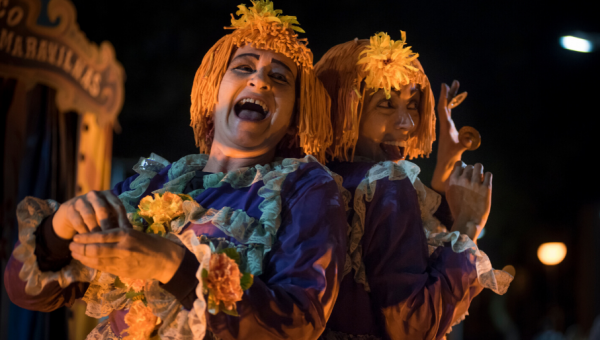Besides art and entertainment, culture advances critical thinking and learning and have impact on economy

Photo: Camila Cunha
“Access to culture enhances learning and is a very powerful tool. It takes us away from where we are, wherever it is”. This is how Andreia Mendes, Psychology professor at the School of Health and Life Sciences and Pedagogy at School of Humanities and researcher at PUCRS –, highlights the importance of culture. The way she sees it, not only is it a form of art and entertainment, but also education. It is one of the areas that employs most professionals – besides automobile and footwear, in Rio Grande do Sul, for example – and generates a direct impact on the economy.
School of Humanities professor, Dr. Ricardo Barberena, mentions a very powerful line by Fernanda Montenegro, the great lady of Brazilian theater. “At the Mérito Cultural, she claimed that these two fields are not complementary. In fact, there is a different relationship between them: ‘culture is education’”. The way Barberena sees it, this underlies all the actions of the Institute of Culture of PUCRS, of which he serves as a director.
“The more one reads, visits museums, listens to music, gets into the world of culture, the greater the power and the capacity for significance within life”, he says. “Students who are equipped to bring culture into their routine, with different backgrounds, develop a very important force within the great challenges and methodologies of education. This increases the ability to create interpretations and validations and compare the world. To work with culture is to work with otherness – the disproportion of life – and to go in relation to the other: different habits, different dances, different ways of enjoying ”, he highlights.
According to Barbarena, one of the roles of culture is to promote empathy. “To understand a world that is not my own, but is permeated with certain pains that I have not experienced. Anyone who can think about the different manifestations of the human has the capacity to learn much more in the classroom, ” he says. The way technology raises our awareness and brings humanization and survival, is an “artifact of the ethical and aesthetic machinery that is the work of art”.
According to some dictionary definitions, culture is the set of social and religious habits, intellectual and artistic manifestations, which characterize a society. According to Andreia, its main benefit is to expand possibilities. “In my understanding, it is seeing beyond, diversity. Culture brings this other view of what is possible, of other ways of thinking about coping, the difficulties of other people, how people are organizing themselves ”, he highlights.
For Andreia, schools, as well as universities, have to work with culture in a cross-sectional way. “We need to think that, when we are studying mathematics, for instance, history can be contextualized through culture. By using different approaches, it is possible to maximize this learning ”, she explains.
To Andrea’s mind, culture, like the unknown, is the means; technology, how people access it, the consumption of content. Online streaming gained prominence on the public’s agenda during the pandemic, as an alternative to major events and to avoid crowds. According to the professor, culture must be accessible to everyone, not only to the elites: “It has to be in public spaces, for all families”.
PUCRS’ Institute of Culture, for example, has adapted its projects and created new ones with a focus on digital platforms since the beginning of the pandemic to bring high-quality content to people’s homes. No Meu Canto, with live sessions of local artists on Instagram; Live de Cabeceira, with an online interview featuring writers; Ateliê da Cultura, offering free workshops; and Ensaios de Morar, with productions of audiovisual poems, are some of the initiatives.
“No matter how much culture is devalued, in different instances, it will always return to the possibility of survival. At the Institute of Culture, we do that ”, the director says.
The creative industry employs more than 130,000 people in Rio Grande do Sul, according to the survey from the state government’s Department of Economics and Statistics in 2019. Considering formal contracts, there are more than 111,000 people hired in the footwear sector and 105,000 in the automobile industry.
The phrase uttered by José Ribamar Ferreira known as Ferreira Gullar, – writer, poet and art critic -, illustrates the results of a report of Cultura nas Capitais, from JLeiva Cultura & Esporte: the higher the level of education, the more access to culture people will have. When asked about their cultural activities, the number of respondents with higher education who consumed art, or attended cultural events, was at least twice as much as those who had only attended school until Elementary school.
When looking at the great universities around the world, one always thinks of the complete human, who works the body and the mind, Barberena explains. “The greater the capacity for consuming culture, the greater the capacity to reach new levels within the university and educational environment. To think about knowledge and fight one of the great evils of the contemporary world: affective illiteracy, the lack of empathy, not feeling shaken in the face of the pain of the other ”, he adds.